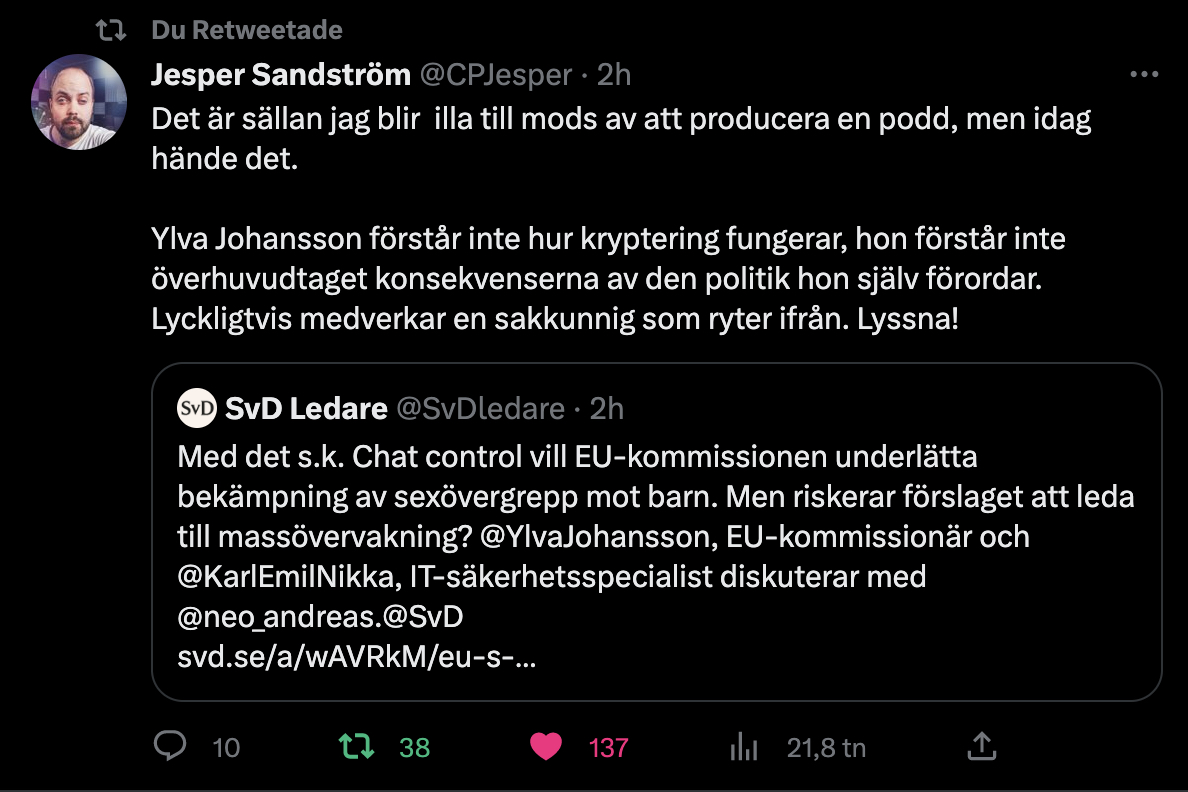Att övervaka alla människor hela tiden, utan brottsmisstanke strider inte bara mot de mänskliga rättigheterna – utan även mot de borgerliga partiernas idétradition.
Sverigedemokraterna, Centerpartiet och Vänsterpartiet säger nej till EU-kommissionens förslag om att kontrollera innehållet i alla medborgares elektroniska kommunikationer, Chat Control. Bland småpartierna säger Piratpartiet och Medborgerlig Samling nej. Edit: Klassiskt Liberala Partiet låter meddela att även de säger nej.
Socialdemokraterna säger ja. Och enligt Justitiedepartementet säger även regeringen ja.
Men det gnisslar inom regeringspartierna. Enligt uppgift finns krafter som vill säga nej inom Liberalerna. Kristdemokraternas ungdomsförbunds ordförande säger nej. Och i Moderata Ungdomsförbundet säger i vart fall Värmlandsdistriktet nej. Så regeringens position är inte självklar.
Idag skriver den moderate riksdagsledamoten och ledamoten i EU-nämnden Jan Ericson på sin blogg:
»Häromdagen påstods att regeringen sagt ja till förslaget. Detta har jag och andra kritiska moderater undersökt de senaste dagarna och det stämmer inte! Följande gäller för regeringens och moderaternas syn på förslaget:
Regeringen ställer sig bakom ambitionen bakom förslaget, dvs. att förebygga och bekämpa sexualbrott mot barn online. Det betyder inte att regeringen sagt ja till det liggande förslaget eller att vi uttalat stöd för detta. Regeringen inser att det är ett omfattande förslag som innebär betydande intresseavvägningar mellan personlig integritet och vikten av effektiv brottsbekämpning.«
Även om man kan ana en glidning här kan man undra varför Justitiedepartementet påstår något annat.
Det är dock uppenbart att det finns en oenighet inom regeringspartierna om Chat Control. Vilket inte är att undra på.
Borgerlig politik skall respektera de grundläggande mänskliga rättigheterna. Man kan rent av säga att de principer som ligger till grund för dessa också är grundstenar för såväl liberal som konservativ idétradition.
Att säga ja till urskiljningslös övervakning av alla människors personliga kommunikationer utan brottsmisstanke är helt enkelt inte borgerlig politik. Och det vet regeringen. Inte minst justitieminister Strömmer.
Ericson (M) skriver vidare:
»I media har det tidigare rapporterats att regeringen stödjer förslaget. Frågan är dock i det närmaste omöjlig att svara på då det fortfarande inte går att säga hur förslaget kommer se ut.«
Men det är just nu det avgörs hur det slutliga förslaget kommer att se ut. Och det är i den processen som den svenska regeringen antingen säger ja till kommissionens förslag (enligt Justitiedepartementet) eller inget alls.
Väntar vi tills alla andra bestämt hur den slutliga texten skall se ut – då kommer vi att ställas inför fullbordat faktum. Igen.
Det är vad som sker just nu i ministerrådet och Europaparlamentet som avgör frågan.
Åter till Ericson i Ubbhult (M):
»Det finns också invändningar mot att förslaget skulle kunna medföra att krypteringsnycklar som krävs för övervakningen skulle komma på avvägar eller hackas, och att det skulle äventyra säkerheten i viktiga funktioner på nätet.«
Vilket är både rätt och fel. Den svagare, interna krypteringen av meddelanden hos till exempel Facebooks Messenger kringgås med sådan här skanning av innehållet, vilket sker redan idag – och skapar uppenbara säkerhetsproblem.
När det gäller end-to-end-krypterade / totalsträckskrypterade meddelanden (t.ex. med GPG) går det inte att inspektera dess innehåll. Enda alternativet är då att förbjuda helkrypterade meddelande-appar som Signal. Vilket kommissionen också hotar att göra i sitt förslag.
Ylva Johanssons förslag om Chat Control är en katastrof. Det strider uttryckligen mot de mänskliga rättigheterna. Det är okunnigt, delvis tekniskt omöjligt och kommer att få allvarliga oönskade konsekvenser. Och det är ett verktyg vars syfte och omfattning lätt kan utökas. Övervakningslagar drabbas alltid av ändamålsglidning.
Regeringen måste säga nej till Chat Control. Även om ett sådant beslut inte skulle vara populärt i kommissionen och ministerrådet.
Läs mer:
• Allt du behöver veta om #ChatControl – resurser, analyser och länkar »
• ChatControl – Ylva Johansson säger orimliga saker, del 1 »
• ChatControl – Ylva Johansson säger orimliga saker, del 2 »
• Chat Control: Ylva Johanssons okunskap får internationell uppmärksamhet »
Lagstiftningsdokument:
• Kommissionens förslag »
• Legislative Observatory »
Relaterade länkar:
• Stop Scanning Me »
• ChatControl.eu »
• ChatControl – granskning av EU-kommissionens förslag
• EU-kommissionen: Övervakning är viktigare än mänskliga rättigheter »
• Why chat control is so dangerous »
• PP: EU-kommissionär Ylva Johansson ljuger om #ChatControl »
• ChatControl – nu är det skarpt läge i EU, men regeringen vill inte tala om saken »
• UN Human Rights Commissioner warns against chat control »
• Regeringen föreslår 18-årsgräns för meddelande-appar
• ChatControl – detta händer i ministerrådet »
• EU:s ministerråd vill kontrollera allt du gör på nätet
• ChatControl: EU-kommissionen duckar alla jobbiga frågor »
• Granskning: Lobbykampanjen för #ChatControl »
TL;DR:
• ChatControl / CSA Regulation – enkelt förklarad »
• Chat Control – på djupet
• EU: Övervakning är viktigare än mänskliga rättigheter
• Skilj på övervakning och massövdervakning






